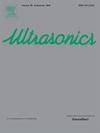Spatial-frequency parallel subsampling for distributed compressive sensing in ultrasonic imaging inspection
Abstract
To address the problem of the high hardware requirements and insufficient data storage capacity in current ultrasonic imaging testing, a novel approach is developed using a programmable device, which combines spatial-frequency parallel subsampling with the distributed compressive sensing simultaneous orthogonal matching pursuit (DCS-SOMP) algorithm to achieve fast and high-quality ultrasonic imaging inspection with a small amount of subsampled data. The spatial sparse measurement method was employed to achieve spatial subsampling and minimize the count of signals. Additionally, frequency subsampling was utilized to significantly reduce the data volume of time-domain signals while ensuring signal quality by truncating the primary testing frequency components. The subsampled data was then reconstructed using distributed compressive sensing (DCS) for multi-channel data reconstruction. The experiment of ultrasonic scanning imaging was conducted on a carbon steel specimen containing six transverse through-holes with a diameter of Ф1.5 mm at different depths. The ultrasonic signals were acquired using the spatial-frequency parallel subsampling method, and subsequently reconstructed using the DCS-SOMP algorithm. The results show that the proposed method achieves comparable image quality to that obtained with complete data, using only 1/8 of the complete data, while accurately locating and quantifying defects.

 求助内容:
求助内容: 应助结果提醒方式:
应助结果提醒方式:


